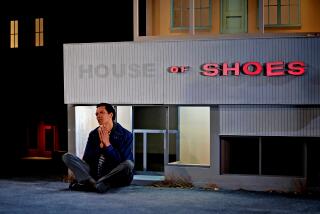Not Quite Parody
- Share via
Still riding the wave of success of “Threepenny Opera,” Bertolt Brecht and Kurt Weill banged out another musical about a gangster and a goody-two-shoes, this one set in 1920s Chicago.
Actually there’s some question as to how much of “Happy End” Brecht wrote. According to the program for the Group Repertory Theatre’s revival, Brecht was credited in the 1929 production for the lyrics but not the book. (Dorothy Lane--a pseudonym--got credit as playwright.) Indeed, Brecht’s trademark Marxism surfaces in only one line at the end: “Robbing a bank is no sin compared to owning one.”
It’s not at all surprising that this Brecht-Weill collaboration has fallen into obscurity. It lacks the edge of “Threepenny Opera,” musically and thematically, and none of the characters has the larger-than-life qualities of Mack the Knife or Polly Peachum.
Instead, we get Bill Cracker, a murderous thug with a penchant for hanging his victims’ hats on the wall of his bar, and Lillian Holiday, a good soldier with the Salvation Army. As Bill, understudy Gerald Brodin was more stiff than menacing. His part isn’t vocally demanding, but he half-spoke his way through his two short songs.
Mary Jo Niedzielski plays Lillian, who first saves Bill from jail and then tries to save his soul. She seems fittingly earnest as the lovely but holy Lil. If it seems out of character for her to lay a kiss on Bill, well, blame Dorothy Lane, who is believed to have been Brecht’s mistress, Elisabeth Hauptmann.
Niedzielski wavers, however, with Weill’s score. His music is rarely easy, combining elements of jazz with modern composition. It takes not just a strong voice, but a strong sense of music to convey the difficult melodies to an audience, and Niedzielski doesn’t rise to the occasion on “The Sailor’s Tango” or “Surabaya Johnny.”
Some of the arrangements by musical director Darrin Newhardt work well--such as the one performed by the Salvation Army using only percussion and trombone. Other tunes, including the catchy “Bilbao Song,” seemed tough for the singers to latch on to.
Still, Newhardt seemed to keep his arrangements simple enough that a pianist could have handled the task. Instead, prerecorded music sapped the production of vigor, and sometimes drowned out half a dozen singers. Worse, a piano in the middle of the set was a constant reminder of what they could have had for a few dollars more.
“Happy End” requires a certain amount of campiness, an acknowledgment from all the actors that this is not serious fare. The Governor (Philip McKeown), while missing an occasional beat, keeps that tone in his performance, as does the over-the-top Mark Atha as Brother Hannibal Jackson. Understudy Vince Cefalu adds a nice sense of physicality to his gangster, Sam Wurlitzer. And Gwen Van Dam is funny as the flustered Sister Mary trying to give a sermon.
The rest of the cast, under Malcolm Atterbury Jr.’s direction, didn’t put itself far enough out on the limb of parody. That’s essentially what “Happy End” is, a sendup of Hollywood’s 1920s gangsters. Everything needs to be ratcheted up to a point approaching the absurd.
Instead, the corset-wearing barmaids seemed out of place. The fact that a gangster called Babyface has a graying beard did not seem funny. Likewise, Sam’s puns about his “organ” fell flat.
None of the songs in “Happy End” has anything to do with anything, granted. In his program notes, Atterbury calls them purely decorative. That’s optimistic. Many are simply padding. The prologue is positively bizarre and best forgotten, and a sing-along reprise of “The Bilbao Song” at the end is entirely unnecessary.
Atterbury also writes that “if the plot were any thinner, it would die of malnutrition.”
Well, acknowledgment of the problem is the first step toward recovery.
BE THERE
“Happy End,” at Group Repertory Theatre, 10900 Burbank Blvd., North Hollywood. Friday-Saturday, 8 p.m.; Sunday, 3 p.m. Ends Dec. 21. 2 1/2 hours. $15. (818) 769-7529.
More to Read
The biggest entertainment stories
Get our big stories about Hollywood, film, television, music, arts, culture and more right in your inbox as soon as they publish.
You may occasionally receive promotional content from the Los Angeles Times.










